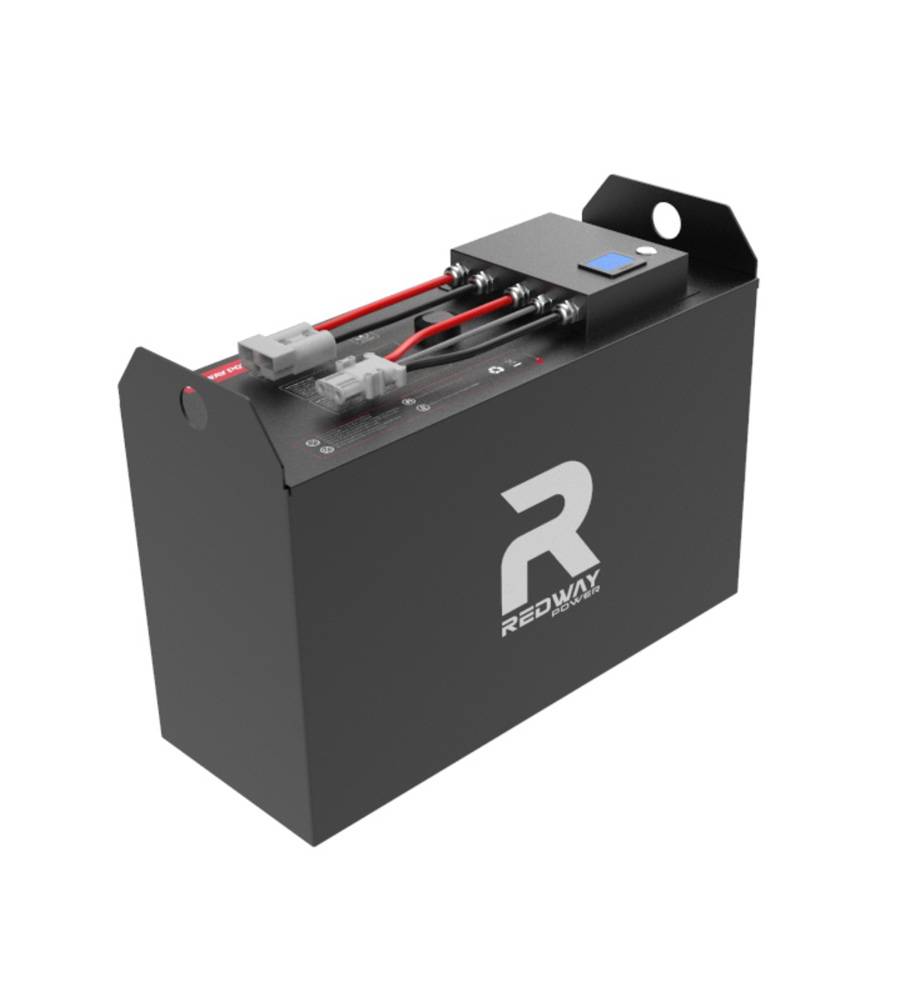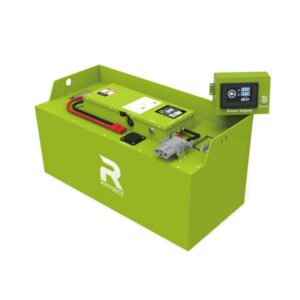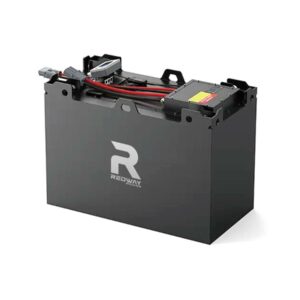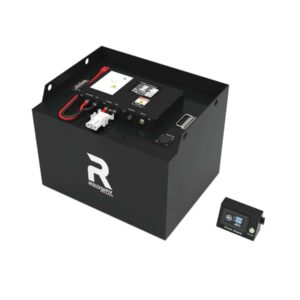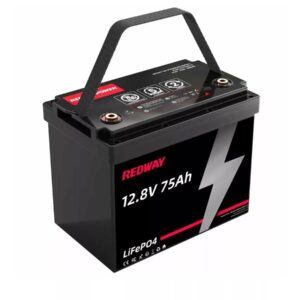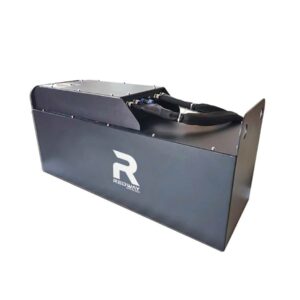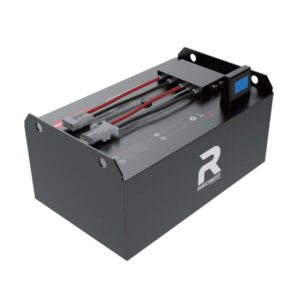Description
Our 24V 280Ah LiFePO4 Forklift Battery redefines industrial power solutions for OEM partners and wholesale buyers. As a professional lithium battery manufacturer, we deliver advanced energy systems that combine durability, efficiency, and intelligent management for seamless integration into modern material handling fleets.
Key Features
Capacity Revolution: 280Ah lithium cells outperform 400Ah lead – acid equivalents, extending shift durations by 35% through 7.16 kWh energy storage.
Cycle Dominance: 5,000+ cycles at 80% DoD ensure 8 – 10 years of service life, reducing replacement costs by 60% compared to traditional batteries.
Peak Power Delivery: Sustains 280A continuous/500A peak discharge for heavy lifting, with 200A rapid charging capability for 80% charge in 90 minutes.
Military – Grade Protection: IP67 – rated metal housing withstands dust immersion and temporary water submersion, ideal for cold storage or outdoor yards.
Smart Monitoring: 24/7 BMS tracks SOC, voltage imbalance, and cell temperature, enabling predictive maintenance via cloud – based diagnostics.
Product Description
Engineered for OEM compatibility, our 24V 280Ah LiFePO4 Forklift Battery (630x251x450mm/60kg) eliminates counterweight modifications across Class I – III forklifts. The modular design features automotive – grade prismatic cells with <2% annual capacity decay, supported by active balancing technology that maintains cell voltage parity within ¡À20mV.
Customizable configurations include 24V/25.6V voltage options and 250Ah – 300Ah capacity variants, with DIN/Anderson connectors available for global fleet compatibility. Our lithium battery solutions reduce total ownership costs through maintenance – free operation and 25 – day expedited delivery (FOB/CIF/EXW terms).
Why Choose a 24V 280Ah Lithium Forklift Battery for Industrial Efficiency?
A 24V 280Ah lithium forklift battery offers high energy density, rapid charging, long cycle life, and lightweight design, making it ideal for heavy-duty industrial forklifts. It delivers consistent power with peak discharge currents up to 800A, supports advanced Battery Management System (BMS) features, and reduces downtime, boosting productivity and lowering total cost of ownership.
What are the detailed specifications of a 24V 280Ah lithium forklift battery?
The 24V 280Ah lithium forklift battery typically has a nominal voltage of 25.6V and a capacity of 280Ah, providing approximately 7.16 kWh of energy. It weighs between 60 to 87 kg depending on design, with dimensions around 630 x 251 x 450 mm. It supports continuous discharge currents of 160A to 300A and peak discharge currents up to 800A for short bursts. The battery features a cycle life exceeding 3500 cycles at 70-80% depth of discharge, an IP65 to IP67 rating for dust and water resistance, and a steel or metal casing for durability.
Chart: Typical Specifications of a 24V 280Ah Lithium Forklift Battery
| Specification | Value |
|---|---|
| Nominal Voltage | 25.6 V |
| Capacity | 280 Ah |
| Energy Stored | 7.16 kWh |
| Weight | 60 – 87 kg |
| Dimensions (L x W x H) | 630 x 251 x 450 mm |
| Max Continuous Discharge | 160 – 300 A |
| Max Peak Discharge | Up to 800 A (5 sec) |
| Cycle Life | >3500 cycles |
| IP Rating | IP65 – IP67 |
How does the Battery Management System (BMS) ensure safety and optimize performance?
The advanced BMS continuously monitors voltage, current, temperature, and state of charge, preventing overcharge, over-discharge, short circuits, and overheating. It balances cells for uniform charge distribution, prolonging battery life. Many batteries feature communication protocols like CANBus, RS485, and 4G connectivity for real-time remote monitoring, diagnostics, and firmware upgrades, ensuring safe and optimized forklift operation.
What advantages do lithium forklift batteries provide over lead-acid batteries?
Lithium forklift batteries offer:
-
Faster charging times (1-2 hours vs. 8+ hours)
-
Longer cycle life (3500+ cycles vs. 500-1000 cycles)
-
Up to 50% lighter weight, improving forklift efficiency
-
Higher usable capacity with >80% depth of discharge
-
Minimal maintenance—no watering or equalizing needed
-
Lower self-discharge rates for longer storage
-
Enhanced safety with flame-retardant electrolytes and thermal protections
These benefits reduce operational costs, increase uptime, and improve workplace safety.
What are the common applications for a 24V 280Ah lithium forklift battery?
These batteries are designed for electric forklifts, pallet jacks, pallet trucks, automated guided vehicles (AGVs), and other material handling equipment in warehouses, manufacturing facilities, ports, and logistics centers. Their high power output and durability suit continuous, heavy-duty industrial use.
How should a 24V 280Ah lithium forklift battery be charged and maintained?
Charging requires a LiFePO4-compatible charger with a constant current/constant voltage (CC/CV) profile, typically charging at 29.2V with current limits between 160A and 300A depending on battery specs. Avoid charging below 0°C to prevent damage. Maintenance is minimal due to sealed construction and BMS protection but includes regular terminal inspection, cleaning, and using monitoring tools for health checks.
What is the expected lifespan and warranty for these batteries?
High-quality 24V 280Ah lithium forklift batteries typically last over 3500 cycles at 70-80% depth of discharge, equating to 5-8 years or more under normal industrial use. Warranties usually range from 3 to 5 years, reflecting confidence in durability and performance.
How do temperature variations affect the performance of these batteries?
These batteries operate effectively within -20°C to 60°C for discharge and 0°C to 55°C for charging. Capacity decreases at low temperatures but remains functional. Integrated thermal management and safety cutoffs protect against damage in extreme conditions, ensuring reliable operation.
How can 24V 280Ah lithium forklift batteries be connected in series or parallel?
They can be connected in series to increase voltage for higher-power forklifts or in parallel to increase capacity and runtime. Proper BMS and battery management are essential to maintain balance and safety in multi-battery systems.
How should one select the right charger for a 24V 280Ah lithium forklift battery?
Choose a charger designed for LiFePO4 chemistry with CC/CV charging profiles, voltage limits around 29.2V, and current ratings matching battery capacity (160-300A). Chargers with temperature compensation and communication compatibility with the BMS ensure safe, efficient charging.

